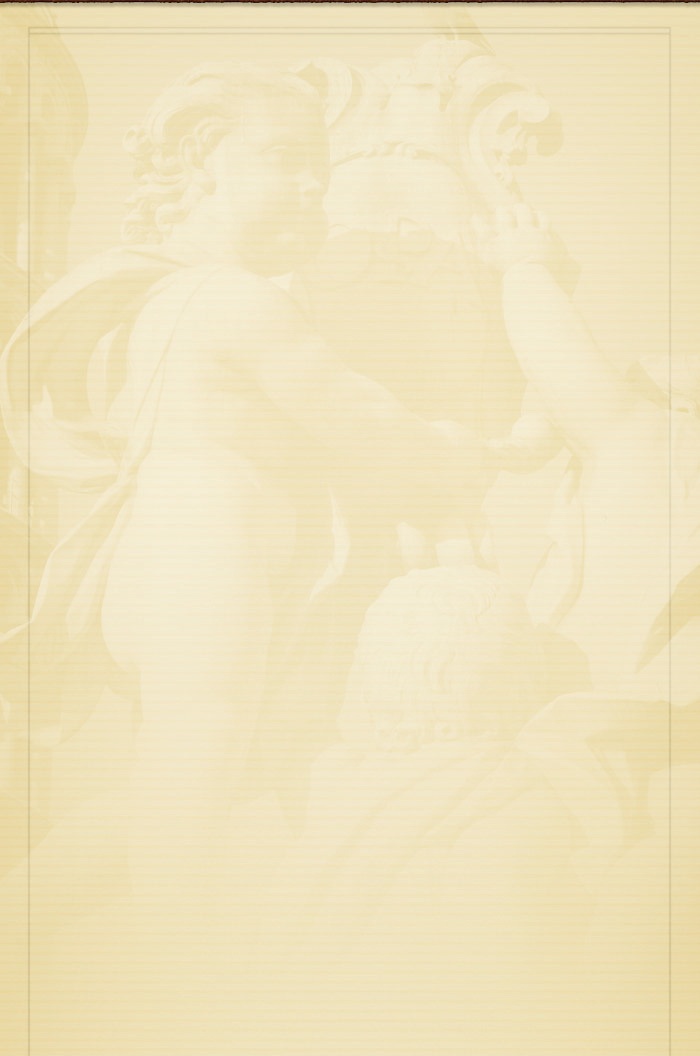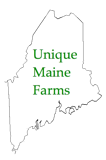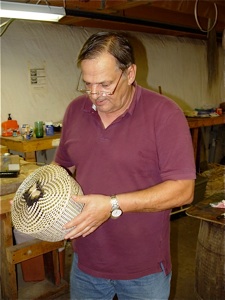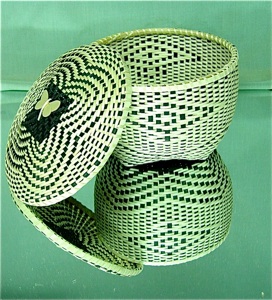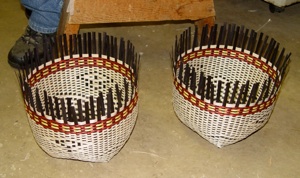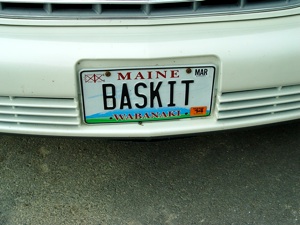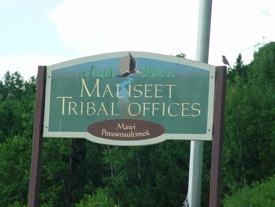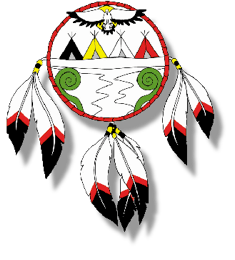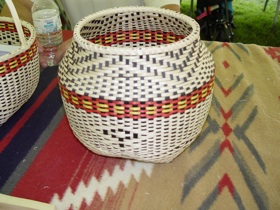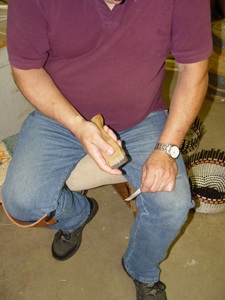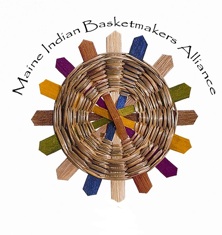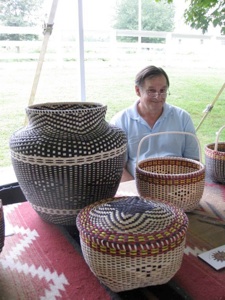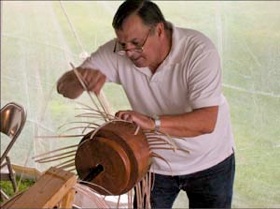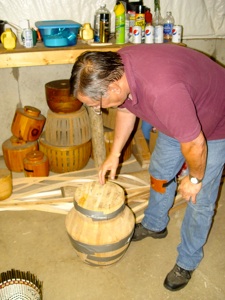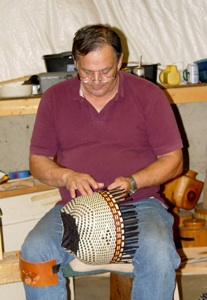Name: Fred Tomah
Address: Fred Tomah
3-2 Clover Court
Maliseet Indian Reservation
Houlton, Maine 04730
Phone: 207-227-1336
Email: fredtomah@yahoo.com
Products and Services:
-handcrafted brown ash baskets
-clover basket
-Katahdin Arctic butterfly basket
-Katahdin smoke signal basket
-Katahdin eagle basket
-Wabanaki basket
-Tomah basket backpack
What Makes Fred Tomah’s Basketry Unique?
If you ever had the opportunity to view one of Fred Tomah’s Katahdin Arctic Butterfly baskets, the outstanding artistic talent of this Master Maliseet basketmaker is immediately apparent. It is fitting that a member of the Maliseet tribe would choose to honor a butterfly that is on the endangered species list in Maine. The Katahdin Arctic Butterfly is only found in one location throughout the world and that is above the tree line on the top of Mount Katahdin. The mountain has always been a revered place by the Maliseets and the other three Maine tribes of the Wabanaki Confederacy - the Passamaquoddys, Penobscots, and Micmacs.
The Maliseet’s name for themselves is Wolastoqiyik which is derived from wolastog which means “beautiful river.” The Meduxnekeag River, a tributary of the St. John River, flows through the Maliseet Tribal Lands. Like the other Native American tribes found in Maine, the Maliseets hold a deep and time-honored love and respect for all aspects of the natural world. The area around the Meduxnekaeg River abounds in many prized plants including wild ginger, maidenhair fern, and showy orchis.
Fred Tomah’s bond with the elements in nature reaches beyond his work with the butterfly baskets. He intentionally weaves elements of his tribal culture, that he regards as significant, into all of his baskets. He has created Katahdin Smoke Signal baskets and Katahdin eagle baskets.
One of the most intricate and time-consuming baskets that Fred creates is the large magnificent Eagle’s Nest Basket. Eagles have always been regarded as sacred in the Maliseet culture. An eagle (cihpolakon) is included flying above the image of the river and the wigwams on the Maliseet tribal logo. The eagle has often been associated with freedom and strength.
In addition to the Katahdin series of baskets that Tomah creates, he also makes beautifully-crafted backpack baskets. In 1990, he was awarded with an Traditional Arts apprenticeship by the Maine Arts Commission to work with Walter James Tomah. The apprenticeship was funded by the National Endowment for the Arts and it enabled him to learn to make the solidly-constructed and highly-functional brown ash pack baskets. These baskets are prized by fishermen, hunters, and trappers to carry their supplies. They are said to be so sturdy that they can be turned over and be used as a seat.
Fred’s baskets have been sought by collectors from throughout the world. They are on display at the Smithsonian Museum of the American Indian in Washington, D.C. and at the Hood Museum at Dartmouth College. The Hudson Museum at the University of Maine at Orono has three of his baskets in their collection. An eight-minute video, which was produced by the Hudson Museum and which provides a good background on the basket making of Fred Tomah, can be viewed on youtube.
The Abbe Museum in Bar Harbor has purchased several of his baskets for their collection. His baskets are also sold in in the Abbe Museum Gift Shop. In 2012, Fred was invited to lead a demonstration of basket making at the Abbe Museum.
In November of 2012, Fred Tomah was a participant in a panel on the “Evolution of Basket Making: From Function to Art” that took place at the University of Maine at Presque Isle. Other renowned brown ash basket makers who participated in the panel included Jeremy Frey, Roldena Sanipass, Jennifer Neptune, and Victor Bear.
Representative Henry John Bear recommended that a Sentiment be passed to recognize Fred Tomah’s contribution to the state of Maine. The Sentiment was passed and read in the Maine State Legislature on February 19, 2013. It has been posted on a webpage in this profile.
Fred has been very active in the land settlement and tribal sovereignty issues. He has served on the Maliseet Tribal Council. Over the years he has shared information about the culture of the Maliseets. His recitation of the story of Gluskap, the hero of the Wabanaki people, was included in “The Story of Maine” in MPBN’s People of the Dawn program.
Fred has been a member of the Maine Indian Basketmakers Alliance for many years. He usually brings his baskets to the MIBA Annual Native American Festival and Basketmakers Market each July on the campus of the College of the Atlantic in Bar Harbor and to MIBA sale at the Hudson Museum in the Collins Center on the University of Maine’s Orono campus. He also usually participates in the Native American Summer Market and Demonstration at the Shaker Village at Sabbathday Lake in New Gloucester each August.
When Unique Maine Farms’ visited Fred Tomah’s downstairs workshop in his home in Houlton this past summer he shared information about how he became interested in making baskets. He and his six sisters were born into a family with a long history of making baskets. Charlie Tomah, the grandfather of Fred, made utilitarian baskets. Charlie, and his brother Gabe Tomah, were both well-known basket makers.
As a teenager Fred would watch his relatives make baskets. By tradition a young individual could not join the Elders in making baskets until they developed their skills to be equal to those of the Elders. Interested participants had to have gathered all their own wood and supplies and have made all their own tools. Fred watched Leo Tomah and Jim Tomah make baskets. These Elders helped to instill a sense of discipline and Fred found that he strove to give his very best to get to their level and be accepted as an equal.
Fred made some of his first baskets in the late 1960‘s. When Fred was drafted in the early 1970‘s, he joined the Marines and served in the Mojave Desert in California. Upon his return from service in 1976, Fred became earnestly interested in honing his skills and making baskets. He has taken basket making to new levels.
The brown ash basket makers in Maine are concerned about the emerald ash borer. This insect has decimated brown ash populations in Michigan and other states. Many agencies and groups including the University of Maine, the Maine Forest Service, the U.S. Forest Service, and the Maine Indian Basket Alliance are working together to take measures to prevent the insect from wiping out the trees in Maine. Fred has attended the Brown Ash Symposium over the years that is hosted by the University of Maine at Orono. He has collected brown ash seeds so that brown ash trees can be planted for the future. He explained that his particular method of making baskets allows for alternative materials to be used. Cane, which is readily available, is a possible option for him.
When Unique Maine Farms visited Fred Tomah in his workshop there was a great sense of serenity.
Fred explained that he never tires of making baskets and he enjoys working with the ash from morning to night every single day. He has gained satisfaction from weaving some of his Maliseet culture into every one of his creations. He has been a key player in the transformation of utilitarian baskets to baskets that are unique works of art. Basket making in the Maliseet Tribe and in the other tribes of the Wabanaki Confederacy has always been greatly valued. Fred Tomah’s endeavors in taking basket making to a whole new level has helped to keep the tradition of basketmaking alive.
